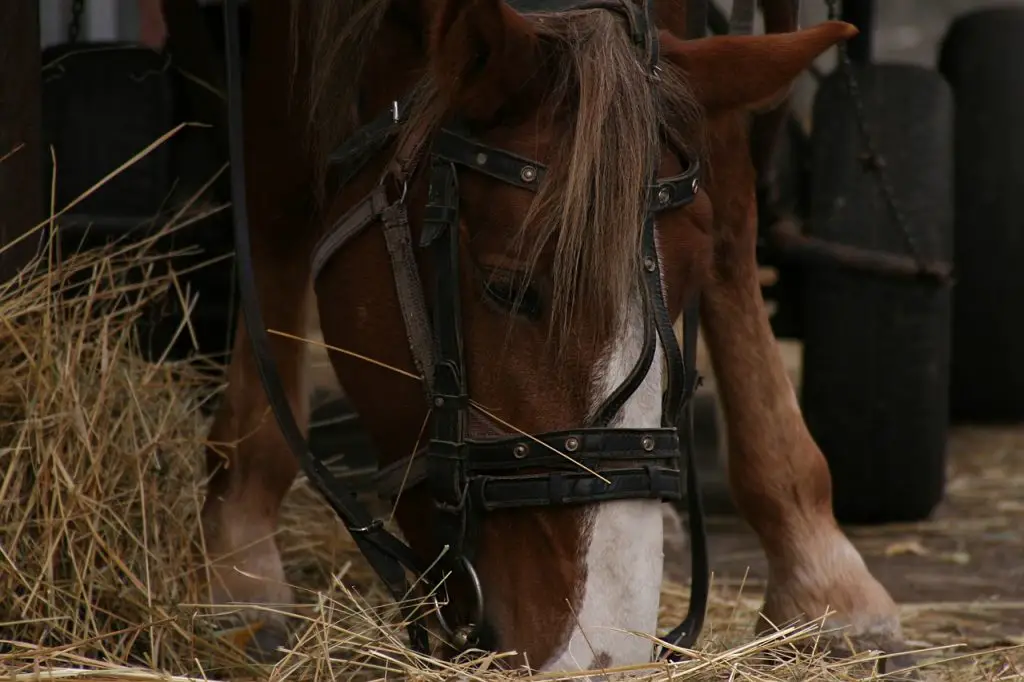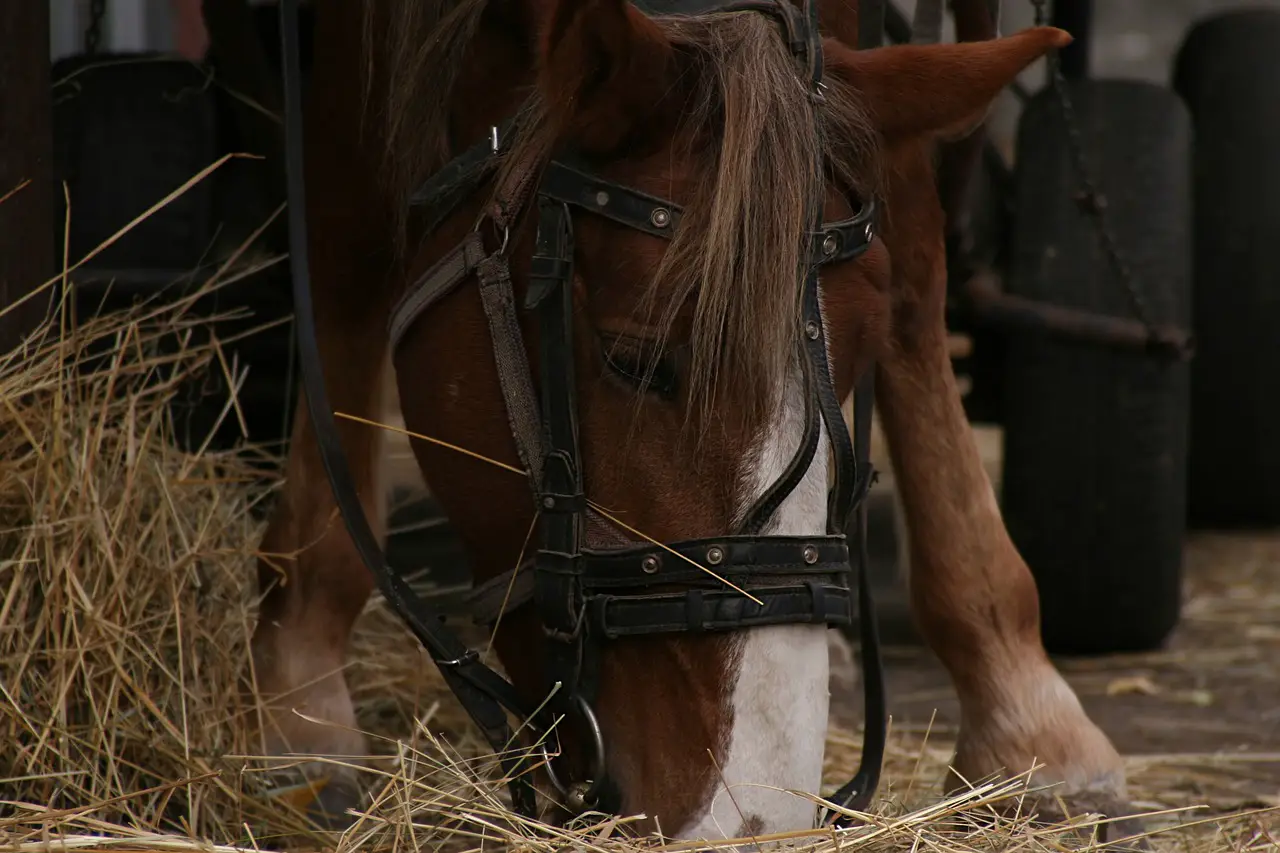Last Updated on March 15, 2022 by Allison Price
Horses with frequent, loose stool can be mild, chronic diarrhea, which is not a problem but does not affect their overall health, to severe, acute diarrhea, which is a medical emergency. Fecal Water Syndrome, also known as Free Fecal Water, is a related condition. This is when horses pass normal, solid manure without fecal liquid. This article will discuss the symptoms and possible causes of these conditions, as well as the veterinary diagnosis and treatment options.
Horses with acute and chronic diarrhea
Diarrhea is a change in the frequency, quantity, or fluid contents of stools. Horses normally pass manure 8-12 times per day. Acute refers to sudden, short-term or rapid progressing conditions. Acute diarrhea in horses can quickly turn into something very serious and even life-threatening. It is important to get help immediately.

Chronic refers to a persistent condition that lasts for a prolonged period of time. Horse diarrhea is defined as frequent, loose stool lasting at least seven days. Others consider it chronic if they have to endure this for more than two weeks. Some experts use a threshold of one month. Some horses with chronic diarrhea are bright and healthy, depending on the cause. They also have a good appetite and adequate water intake. The horse’s health is not affected by the persistent watery, soft stool. It just causes the environment, hind legs, and tail to become constantly dirty. For others, chronic diarrhea can lead to a sick horse. A vet should be involved.
Causes
Horse diarrhea can be caused by a variety of infectious and non-infectious factors, including:
Infectious
- Bacterial infection (Salmonella, Clostridia)
- Viral infection ( Equine Coronavirus).
- Parasitic infection
Non-infectious
- Change in diet
- Antibiotics
- Non-steroidal anti-inflammatory drugs (NSAIDs) are also known as bute.
- IBD or Inflammatory Bowel Disease
- Sand ingestion
- Stress (such stress from competing or trailering)
- Gastric ulcers
- Toxins
- Secondary to another condition or disease, such as peritonitis
- Alteration in organ function, such as chronic liver disease and heart failure
- Cancer
Sometimes, chronic diarrhea can develop after an episode of acute diarrhea.
Signs and Symptoms
Horse diarrhea is an increase in frequency, volume or fluid content of feces. A mild case might have a few more manure heaps per day than usual that are more consistent than regular, formed fecal balls. This could be considered a case where the horse does not show any other symptoms.
If the horse’s diarrhea is severe and persistent, or worse, “pipestream”, or if it is accompanied with other symptoms such as colic, dullness or fever, or purple-to-red gums, then a veterinarian should examine the horse immediately.
Diagnosis
It can be difficult for both horse owner and veterinarian to determine the cause of a horse’s frequent, loose stool. The first step is to take a detailed history.
- Age, any medical conditions and medications
- Current feeding program (hay, pasture, grain, or supplements)
- Exercise and turnout
- Recent changes in diet, work load, and management
- Experimentation with new horses and new facilities
Owners should also be ready to provide a detailed accounting of the problem. It should include the date and nature of the problem, as well as the symptoms and any treatments used.
The vet might recommend specific tests after a thorough physical exam. Bloodwork can be used for example to check for anemia in red blood cells and for infection in white blood cells, assess the health of the liver and kidneys, and look for electrolyte or acid-base abnormalities. There are a variety of tests that can be done on feces, including counting parasite eggs and checking for sand.
An abdominocentesis, or “belly tap”, can be performed by a veterinarian to check the fluid inside the abdomen. Ultrasound and radiography (xrays) may also be used to image specific structures. A visual assessment of the horse’s stomach or duodenum and the collection of tissue samples could also be done. Even during a palpation, samples or biopsies of the rectal tissue can be taken. The barn can easily perform an intestinal absorption test, which measures the efficiency of sugar absorbed from the intestine.
Management & Treatment
In well over half the cases of horses suffering from frequent, loose stool, the primary cause is not fully understood. Therapy is therefore primarily supportive and not specific. The choice of therapy and the place it is given will depend on whether the horse has severe diarrhea or mild, persistent diarrhea. It may be necessary for severely ill horses to be admitted to hospital to receive more intensive, 24-hour nursing and observation. Our article provides more information about treatment and complications as well as prevention of colitis (a potential cause of diarrhea).
If the goal is to restore normal intestinal microflora, and encourage regular, firm manure, it may be possible to achieve better results in the horse’s home. Probiotics and prebiotics are common recommendations at this stage. Dietary trials to eliminate or add in ingredients that horses can easily digest and absorb are also recommended. For horses suffering from chronic diarrhea, it can take months or even years to find the right mix of forage, grains, supplements, medication, and other ingredients. Some horses experience temporary relief, while others may not be able to find a permanent solution. These cases require owners to ensure that the horse has easy access to water and that the tail and hind legs are clean to avoid skin irritations and attracting flies.
Horses with Fecal Water Syndrome
Fecal Water Syndrome (FWS), also known as Free Fecal Water (FFW), is a condition that occurs in horses. It is distinct from diarrhea/loose stool. Fecal water syndrome is a condition in which horses pass fecal liquid apart from normal, solid manure. It can happen before, during, and after defecation or completely independent of it. It is a relatively common condition that has been recently recognized by the veterinary community. FWS is mostly a cosmetic issue for horse owners, as the hind legs of horses are often chronically wet and filthy. However, skin lesions can develop from persistent soiling with fecal fluid.
Causes
FWS is a condition that affects horses. There are many theories about why horses get it. German researchers explored some theories, and found that FWS was not associated with either dental disease or heavy parasite burden. It was more likely that it would occur.
- Horses of low rank or “pecking orders” in the social hierarchy of herds
- Winter was a time when subordinate horses were restricted to smaller spaces, which led to anxiety.
- In geldings and mares, which are more dominant than geldings
- in paint horses
Further research is needed to determine the role of nutrition and stress in the development and management FWS.
Diagnosis
A veterinarian will approach the diagnosis of FWS in a similar way as a horse suffering from diarrhea or loose stool. The veterinarian will take a detailed history from the owner and then conduct a physical exam with a special focus on the digestive system. Finally, the vet may recommend additional tests to assess the horse’s health in general and the GI tract specifically. A thorough examination can confirm that the horse has clean stall walls and bedding, as well as hind limbs and tails. The vet might want to go through the management and feeding programs, including the turnout and herd status, while they are on the farm.
Treatment & Management
There is no set of recommended treatment for horses suffering from FWS. However, it is important to address all possible causes of disruption in the GI system, including social stress. It could be as simple as adjusting the turnout or decreasing it, changing the diet gradually with input from a veterinarian and nutritionist, or testing the effects on the passage of fecal fluid. Some horses respond well to less “bulk”, or long-stem forage, or to Omega 3 fatty acids to normalize the gut’s inflammatory response. They also seem to like the stabilizing effects from “baker’s yeast” and Saccharomyces cerevisiae.
To prevent sores, it is also important to keep the skin on your hindquarters dry and clean. You may be offered practical tips by your vet to keep the skin healthy, such as summer fly management, winter blanketing tips and tail solutions.
Conclusion
A sudden and severe case of diarrhea in horses can lead to serious health problems. Chronic diarrhea and Fecal Water Syndrome can also be a problem for horse’s appearance and health. It is important to seek medical attention as soon as possible if your horse has unusual manure. This will allow you to rule out any serious or minor causes and help you to improve defecation.


